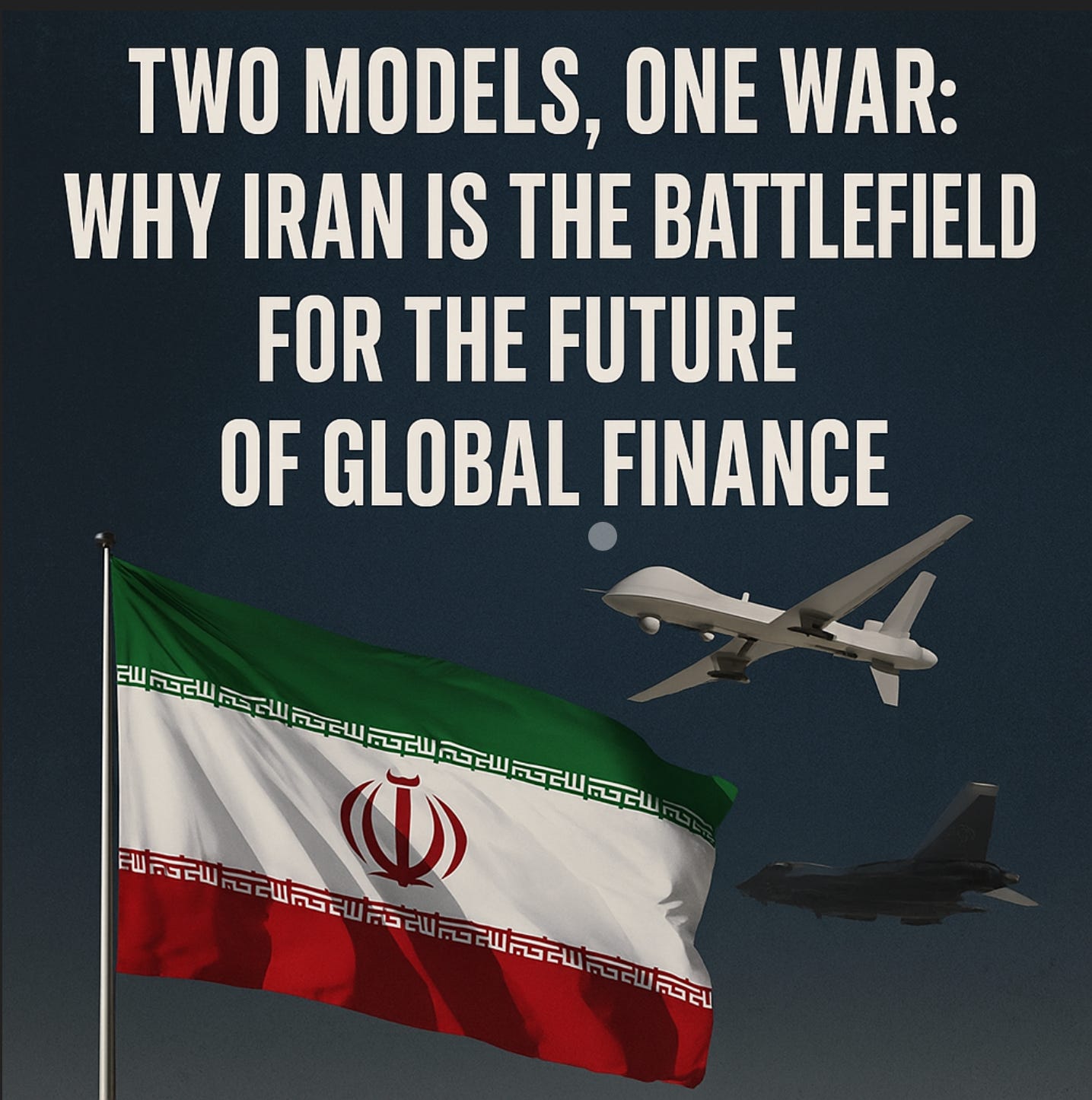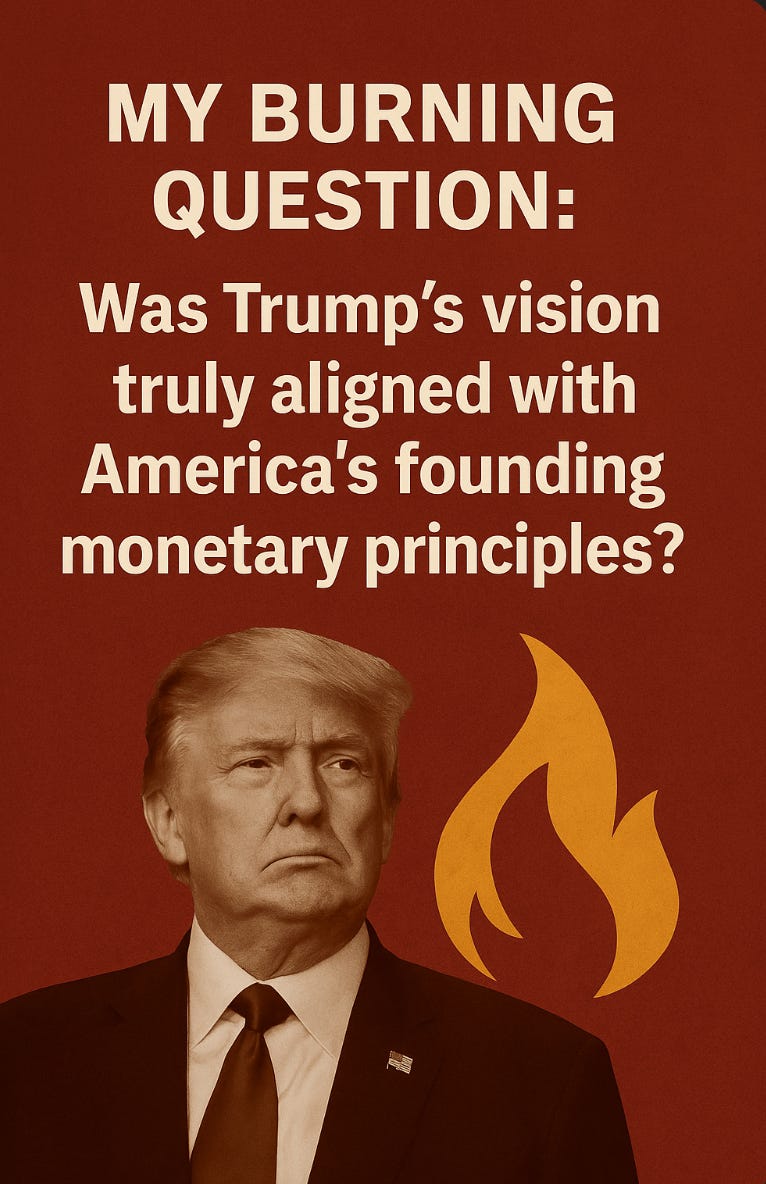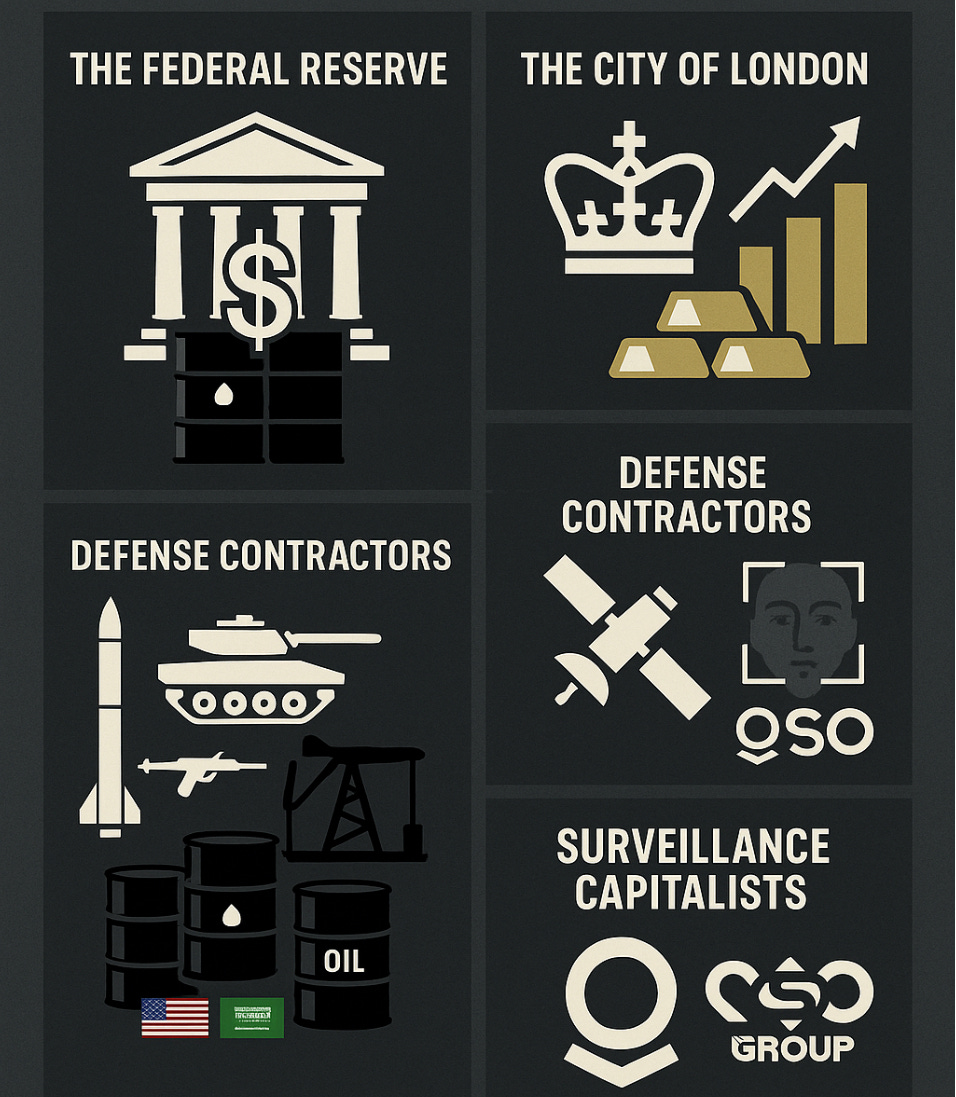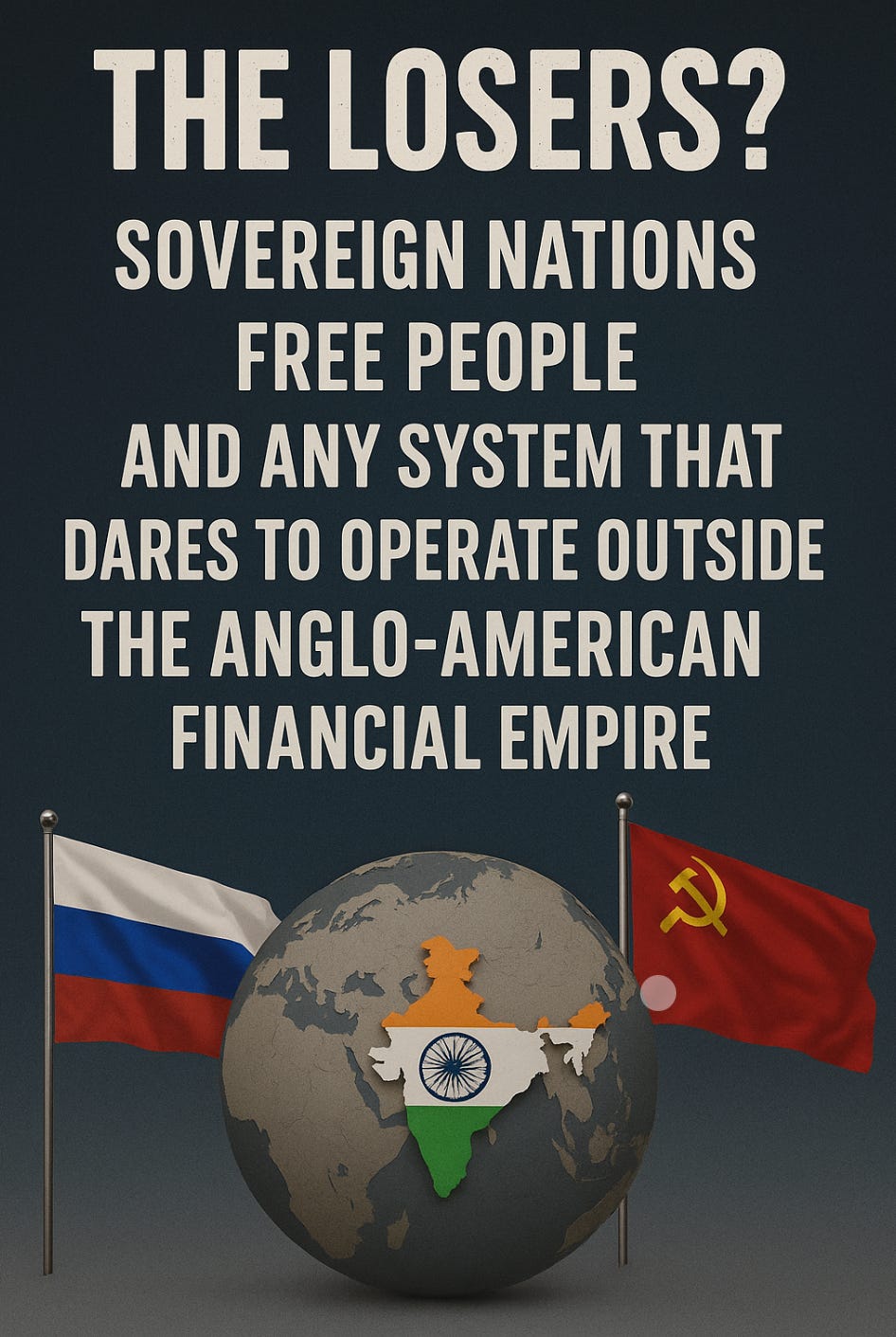Two Models, One War: Why Iran Is the Battlefield for the Future of Global Finance
An opinion analyzing the history of Iran, the western central banks and the growing BRICS model.
Sponsored by American Made Foundation Analysis and opinion only of Ann Vandersteel
In the halls of power, they’ll tell you wars are fought for freedom, democracy, or peace. But if you peel back the slogans, you’ll find that the longest wars—and the most targeted nations—have one thing in common: they defy the global financial order.
This is the real story of Iran. It isn’t just about nukes, terror, or revolution. It’s about a nation that tried to chart its own economic course outside the grip of Western central banks, and what happened when it did.
A Quick History for the “Too Young or Too Lazy”
Let’s be clear: Iran’s fight with the West didn’t begin in 1979. That was the explosion. The fuse was lit in 1953, when democratically elected Prime Minister Mohammad Mossadegh dared to nationalize Iran’s oil—ending British colonial control via the Anglo-Iranian Oil Company (now BP).
Rather than use economic diplomacy, the U.K. and U.S. overthrew him in a CIA/MI6-backed coup (Operation Ajax). Why? Because allowing Iran to control its own energy would upend the entire British-run, City of London–underwritten petroleum and financial empire.
Mossadegh’s secular, nationalist democracy was replaced with a brutal monarchy loyal to Western interests. The Shah ruled with the CIA-trained SAVAK secret police, and Iran became a vassal to foreign banks and oil companies.
From Coup to Theocracy to Nuclear Target Explained in Greater Detail
The 1979 Islamic Revolution was not born in a vacuum. It was the inevitable backlash to over two decades of U.S.- and U.K.-backed authoritarianism that followed the 1953 CIA/MI6 coup. The West had overthrown a democratically elected leader, Mohammad Mossadegh, not because he was a tyrant or extremist, but because he dared to nationalize Iran’s oil and reject the extractive grip of British and American corporate empires. In his place, they installed the Shah, who—backed by Western intelligence agencies and enforced through the brutal SAVAK secret police—systematically repressed dissent, looted Iran’s resources for foreign interests, and widened the gap between a modernizing elite and a disillusioned populace. The Revolution, then, was not merely an Islamic revolt—it was a national uprising against foreign domination masquerading as modernization. That it was ultimately seized by theocratic hardliners was a direct result of the vacuum left by Western betrayal of secular self-rule.
Fast-forward to the present: Iran remains a pariah—not because it breaks the rules, but because it refuses to play by the West’s financial rules. Its defiance is not rooted in unprovoked aggression but in its continued refusal to integrate into the City of London–Federal Reserve–IMF global financial architecture. Iran won't sell oil in dollars, won't accept structural IMF debt traps, and won't allow foreign control over its infrastructure, central bank, or currency. That refusal alone is enough to label it a threat. The “nuclear crisis” is merely a convenient pretext. Just like in 1953, it’s not Iran’s weapons or leaders that are the true problem—it’s Iran’s sovereign will to control its own resources, trade routes, and future outside the globalist order. That’s why it remains a target—because in a rigged system, independence is the ultimate rebellion.
Two Systems Collide: The City of London vs. BRICS
The global financial system is not simply "the West." It is centered in the Bank of International Settlements (BIS), a sovereign financial district with its own laws, its own government, and deep control over the City of London, Federal Reserve, IMF, ECB, World Bank, and Wall Street.
This system is:
Petrodollar-dependent
Debt-backed and fiat-based
Enforced via SWIFT, sanctions, and U.S./NATO military force
Structured to extract value from developing nations through loans, structural adjustments, and regime change
Iran threatens all of that—because it dares to build energy partnerships with Russia, China, and now BRICS. It dares to trade oil outside the dollar. It dares to build infrastructure instead of taking IMF debt.
BRICS, by contrast, is building a multipolar financial world based on:
Commodity-backed settlements
Sovereignty-first trade deals
Alternative banking systems (like the BRICS Bank and cross-border payment platforms)
An escape from the West's financial chokehold
In this paradigm, Iran is a keystone, not a rogue state.
So Where Does President Trump Fit In?
Many assume Trump is an anti-globalist. His rhetoric certainly is:
“America First”
Opposition to NATO’s drain on U.S. resources
Criticism of the Federal Reserve
Calls to end endless wars
But his actions paint a more nuanced picture.
Trump Aligned with the City of London System When:
Reimposing crushing sanctions on Iran, designed to protect the petrodollar
Assassinating Qassem Soleimani, a direct hit to Iran's regional influence
Partnering with Israel, whose security establishment is deeply embedded in Anglo-American finance and military policy
Hiring Scott Bessent, previously a hedge fund manager and partner at Soros Fund Management into his current administration and previously hiring Goldman Sachs alumni Steven Mnuchin to run Treasury policy in his first term
Preserving the SWIFT system and Fed-backed debt paradigm
President Trump Partially Resisted When:
Pulling out of the TPP and Paris Climate Agreement
Undermining IMF/UN-backed ESG enforcement
Trying to decouple from China in trade and tech
But at the end of the day, Trump did not align with BRICS. He sought to restore American dominance within the existing system, not dismantle it. (My expanded answer to this question will come below - keep reading)
My Burning Question: Was Trump’s vision truly aligned with America's founding monetary principles?
Constitutional Monetary Policy vs. Today’s Banking Cartel
What Did the Constitution Actually Say?
The U.S. Constitution, Article I, Section 8 and Section 10, is clear:
Only Congress can coin money and regulate its value.
No state can “make any Thing but gold and silver Coin a Tender in Payment of Debts.”
In other words:
The Founders explicitly rejected fiat currency, central banks, and debt-based monetary systems.
They favored sound money, tangible value, and limited monetary manipulation.
The Federal Reserve + Western Central Banks: A Betrayal of the Constitution
The BIS model including the City of London–Federal Reserve alliance, ECB, and IMF) is directly opposed to constitutional principles:
It is based on fractional reserve banking, where money is created from debt—not from coinage backed by real assets.
The Federal Reserve is a quasi-private bank, not accountable to the people or the Constitution. It issues fiat dollars out of thin air and manipulates interest rates and inflation.
Western central banks control nations through credit issuance, currency debasement, and financial coercion (sanctions, SWIFT, IMF terms).
This system is anti-sovereignty, anti-transparent, and anti-constitutional.
BRICS: Closer to the Founders’ Intent?
The BRICS model, while far from perfect, aligns more closely with constitutional monetary principles in key ways:
BRICS is pushing for commodity-backed settlement systems—including gold, oil, and potentially national currencies pegged to real assets.
It opposes the unipolar banking model and champions sovereign monetary policy—not dictated by a central global authority like the IMF or BIS.
BRICS countries have publicly advocated for alternatives to the fiat petrodollar system—a move the Founders might support to prevent foreign entanglements and debt servitude.
In short: BRICS isn’t playing the fiat game. They're building a sound money system backed by real assets—gold, oil, commodities—limited government and saying NO to global debt slavery. This is about sovereignty, not servitude. This is sovereign currency revolution, not global banker control.
My Analysis: Trump’s Position in Light of the Constitution
“But at the end of the day, Trump did not align with BRICS. He sought to restore American dominance within the existing system, not dismantle it.”
This reveals the central contradiction of Trump-era economic policy:
His anti-globalist rhetoric resonated with constitutionalists.
But in practice, he protected the very fiat system the Constitution was designed to prevent.
Trump’s goal was national dominance within an unconstitutional global banking order, not a return to constitutional money and sovereignty.
So, if Trump had truly pursued constitutional restoration, he would have:
Audited or abolished the Federal Reserve
Pursued a gold- or asset-backed dollar
Aligned with BRICS’ move away from fiat dominance
Instead, he kept the Fed, defended the petrodollar, and maintained U.S. hegemony within the same corrupt system.
Back to Iran: Are Today’s Strikes on Iran a High-Tech 1953?
Yes—just modernized. While 1953 was a coup, today’s tactics are:
Precision bombings of nuclear facilities
Targeted sanctions
Covert assassinations
Cyber warfare and sabotage
All without boots on the ground—but with the same goal: keep Iran from becoming a sovereign, self-directed power with control over its energy and trade under the continued threat narrative of WMD. (Sound familiar? - Iraq, Syria…)
Like in 1953, the goal isn’t peace. It’s to protect centralized financial control over to collateralize the debt obligations of western central banks using global trade routes, especially oil exports into Western Europe. Iran’s alignment with China’s Belt and Road and Russia’s energy networks threatens to reroute petroleum and influence away from London, Brussels, and D.C.
Let’s be Honest: Who Really Benefits?
Let’s be blunt. This is not about national security—it’s about:
The Federal Reserve: Keeps the dollar in global demand by enforcing dollar-only oil trades
The City of London: Maintains dominance over commodity pricing, currency flows, and sovereign debt enforcement, and collateral to back their debt issuance
Defense contractors: Raytheon, Lockheed, Rafael—all cash in during tensions and arms buildups
Big Oil: U.S. and Saudi producers gain market share every time Iran is sanctioned
Surveillance capitalists: Palantir, NSO, and Western-Israeli intel firms expand footprint in chaos
The losers? Sovereign nations. Free people. And any system that dares to operate outside the Anglo-American financial empire.
My Final Thought
This isn’t about nukes. This isn’t about democracy. And this isn’t just about Trump.
This is a centuries-old struggle between sovereign self-determination and centralized financial domination—and Iran is the battlefield.
This is more than a modern geopolitical rivalry—it’s the continuation of a centuries-old struggle between sovereign self-determination and centralized financial domination, precisely the kind of entanglement the Founding Fathers warned against. George Washington, in his Farewell Address, cautioned against "permanent alliances" and foreign intrigues that would compromise the independence of the Republic. Thomas Jefferson echoed the same principle: “Peace, commerce, and honest friendship with all nations—entangling alliances with none.” These weren’t isolationist slogans—they were protective barriers against the very kind of globalist financial warfare we see playing out today.
If BRICS continues to succeed, it won’t just be a victory for emerging markets—it will represent a restoration of sovereign economic agency in the tradition of the Constitution itself: nations trading freely, managing their own currency, and refusing to be vassals to foreign debt issuers. But if the City of London wins again—backed by the IMF, BIS, and private central banks—we will remain trapped in a world where monetary control substitutes for military occupation, and unelected financiers dictate policy to so-called democratic governments. This isn't just about Iran or BRICS. It's about whether any nation—including our own—has the right to chart its economic future free from the invisible hand of a transnational banking cartel. The Founders would not only recognize this moment—they would rally against it.
If BRICS continues to succeed, the world may finally break free from the imperial grip of fiat bankers, debt slavery, and rigged markets.
But if the City of London wins again? Expect more coups, more bombings, and a future dictated not by elected leaders—but by unelected financiers cloaked in diplomacy and force.
Subscribe for more deep dives into the hidden mechanics of power. Share if you're tired of narratives that only scratch the surface.
#Iran #Trump #CityOfLondon #BRICS #Petrodollar #Geopolitics










I welcome that action sooner than later. Fact is millions of Americans are in a terrible financial spot. I do realize that this is WAR and that innocent (whether ignorant or not) do get caught in the crossfire. Jimmy “Peanut farmer” Carter sure did a number on our level of civics with the Dept of Indoctrination he installed back in 1979!
Excellent, Ann! Will share. As you know, Iran has been 8 seconds from getting nukes for decades.